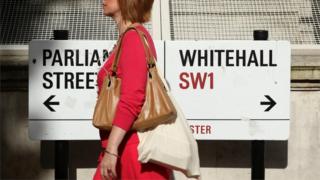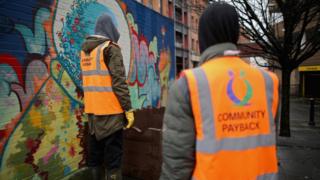
 Image copyright
Image copyright
PA
Major changes to the civil service are needed to tackle “group think” in government, Michael Gove has said.
The Cabinet Office minister said the “metropolitan” outlook of decision-makers had contributed to government becoming “estranged” from the people.
More diversity in recruitment and emphasis on mathematical and scientific skills was key to making officials more responsive to the public’s needs.
Boris Johnson’s advisers are reportedly planning a major Whitehall shake-up.
In recent days there has been speculation about the future of the UK’s top civil servant, Sir Mark Sedwill, who serves as cabinet secretary in No 10 and the PM’s national security adviser.
There have been reports of tensions between Sir Mark and some of the PM’s political advisers over the government’s handling of the coronavirus pandemic.
Sir Mark was appointed by former PM Theresa May in 2018 after working alongside her at the Home Office.
The Financial Times reported that he could announce his departure as early as Monday.
In response, No 10 said Sir Mark “continues to work closely with the senior team to ensure that the government receives all the advice that it needs”.
- PM asks Foreign Office chief to stand down
- PM ‘will not return to austerity of 10 years ago’
Meanwhile the Conservative Home website quoted friends of Dominic Cummings, who is regarded as Boris Johnson’s most influential aide, saying he told a meeting last week that a “hard rain is coming” to No 10 and the Cabinet Office, which co-ordinates the implementation of policy across the government.
In a speech on the future of government and the role of the UK’s politically neutral civil service, Mr Gove said the coronavirus pandemic had highlighted the scale of the “structural inequalities” in UK society.
In the speech, he said the government’s mission to level-up economic opportunity in Britain required ambition, innovation and experimentation on a scale comparable to US President Franklin Roosevelt’s 1930s New Deal.
However, he suggested the government was not well placed to respond to the economic challenges and opportunities posed by automation, artificial intelligence and robotics, because of its “distance” from the people.
‘Cosy consensus’
Mr Gove, who like Mr Cummings was a key figure in the Vote Leave campaign, said the 2016 Brexit referendum result had laid bare the extent to which “every arm of government seemed estranged from the majority”.
As well as moving more civil servants out of London, he said the lack of commercial expertise must be sorted, with more decision-makers with a proper understanding of mathematical, statistical and probability questions.
Image copyright
Reuters
Dominic Cummings is reportedly planning changes to how government works
“Government departments recruit in their own image, are influenced by the think tanks and lobbyists who breathe the same London air and are socially rooted in assumptions which are inescapably metropolitan,” he said.
“An important part of bringing government closer to people is making sure we have not just a wider spread of decision-making across the country but a broader and deeper pool of decision-makers.
“Group think can affect any organisation – the tendency to coalesce around a cosy consensus, resist challenge, look for information which confirms existing biases and reject rigorous testing of delivery.”
While education secretary in the coalition government between 2010 and 2014, Mr Gove famously sought to take on the teaching establishment. He derided it as “the blob” and suggested it had an unhealthy grip over teacher training, classroom standards and qualifications.
In his job as Cabinet Office minister and Chancellor of the Duchy of Lancaster, Mr Gove is responsible for relations with the civil service.
A number of top civil servants have either left their posts or are set to depart in the coming months following the Conservatives’ election victory in December.
Philip Rutnam is bringing a case for unfair dismissal against the Home Office after quitting in February while Simon McDonald is leaving the Foreign Office in September following its controversial merger with the Department for International Development.
The head of the FDA union which represents senior civil servants, Dave Penman, commended Mr Gove’s speech as “thoughtful and insightful” but hit out at what he said appeared to be repeated briefings against Sir Mark.
Source link


